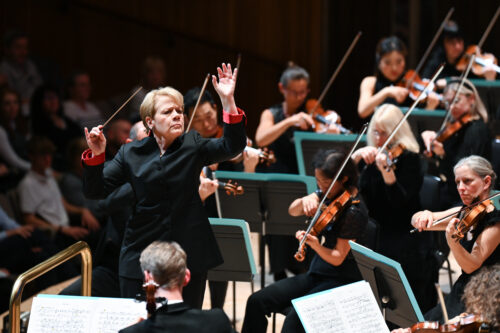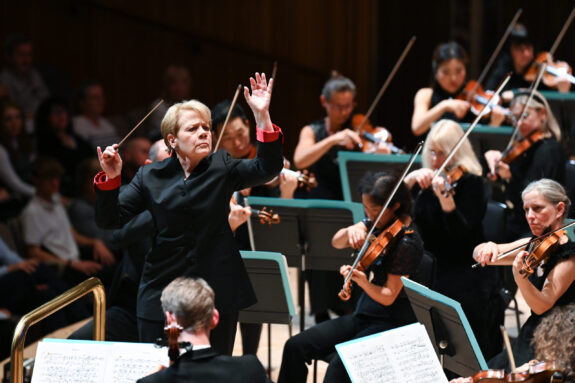 United Kingdom G. Mahler, A. Mahler: Sasha Cooke (mezzo-soprano), Philharmonia Orchestra / Marin Alsop (conductor). Royal Festival Hall, London, 24.10.2024. (CC)
United Kingdom G. Mahler, A. Mahler: Sasha Cooke (mezzo-soprano), Philharmonia Orchestra / Marin Alsop (conductor). Royal Festival Hall, London, 24.10.2024. (CC)

Gustav Mahler – Blumine (1888); Symphony No.5 (1902)
Alma Mahler – Four Songs from Fünf Lieder (1910, orch. D. & C. Matthews)
This was a wonderful programme, on paper. Gustav and Alma Mahler, locked forever in our memories of a complex relationship, rub shoulders with Alma the filling in a Gustav sandwich. It was ever so, Alma second fiddle in composition, banned from composing when the pair married (at least, by ‘mutual’ agreement), released in the wake of an affair with the young architect Walter Gropius.
Marin Alsop meditates interestingly on all of this in a printed interview in the concert programme: ‘I wanted to pair it [the Fifth] with her songs in this programme because their connection of being two composers really is a lynchpin in how their relationship develops and the problems they have, and the challenges they have to overcome. I feel that together, they give us a snapshot into this special couple’. The same interview attributed Blumine to the Fifth Symphony, though, not the First, which one has to assume is an editorial error, not Alsop’s.
Originally written as incidental music to a play in 1884, Blumine, in 1888, became the second movement of the so-called ‘Titan’ Symphony. There is no doubt that the piece is magically scored, and the Philharmonia performance itself was full of magic, and well-paced by Alsop. The trumpet solos were wonderful, too, but what was most arresting was Mahler’s ‘interruptive’ use of the harp, an extra splash of colour to the Mahlerian canvas. Blumine is heard all too rarely live: the last time I heard it in concert was in 1997, at a Prom conducted by Leonard Slatkin with the BBC SO, where it heralded another second-half Mahler symphony (the arguably more apposite First Symphony) and immediately prefaced the world premiere of Roger Reynolds’s The Red Act Arias.
Entering into Alma’s world was quite a shift, the sound less (Gustav) Mahlerian, more overtly Zemlinskian (Alexander Zemlinsky, her teacher, and lover). These were heard in a most sensitive orchestration by the Matthews brothers (David and Colin, both experienced in Mahler musicology), and how one heard that Zemlinsky influence in the harmonies of ‘Der stille Stadt’ (‘The Silent Town’). US singer Sasha Cooke is a real mezzo, dark of voice, superbly lyrical, full-voiced, delivering the perfect amount of vibrato. The fourth of the five songs was heard next, the deliciously free and light ‘Bei dir ist es traut’ (‘With you I am at ease’). The scoring was woodwind dominated, with some lovely oboe solos; this was expert orchestration from a piano score that simply invites instrumental colour. The third song came next, ‘Laue Sommernacht’ (‘Mild summer’s night’). This is a more narrational song, the phrases long and individual. This is, to my ears at least, Alma Mahler’s (Wagner) Tristan und Isolde Act II in microcosm, although some of this sounds Richard Straussian; it also felt surprisingly incomplete at its close. Finally, ‘In meines Vaters Garten’, (‘In my father’s garden’, the second of the five). Perhaps Cooke’s voice was a touch heavy for this song, but she acted it out beautifully; but most special are Alma’s harmonies, radiant in the Matthews’s orchestration at the image of the ‘dreamy red of morning’. A revelation. The missing song, incidentally, is ‘Ich wandle unter Blumen’ (‘I wonder among the flowers’).

Finally, Mahler’s Fifth Symphony. Alsop’s way is relatively brisk, her Adagietto very much on the move (as one can hear from her recording with the London Symphony Orchestra), perhaps a touch low in soul. Alsop was mentored by Leonard Bernstein, and any Fifth I hear is coloured by the memory of the great man’s Fifth with the Vienna Philharmonic at the BBC Proms. Alsop concentrates on detail throughout, even down to the part writing of the brass delivered at a healthy fortissimo. What seemed missing in the first movement was menace, especially in the lower strings – there was little nightmarish (Nightmarisch?) about this. The second movement is if anything even more technically difficult for the orchestra and one sat in wonder at the Philharmonia’s unified excellence, perhaps in particular in the complete absence of strain in the upper violins (married to complete unanimity).
It was the Scherzo that brought out the finest aspect of this performance by far: the solo horn of Norberto López. He has a sound that could single-handedly overwhelm an orchestra by itself; everything was in place, each phase carefully considered, and issued with a heroism Richard Strauss, never mind Gustav Mahler, would have been proud. López was perfectly in control of his instrument and, while sometimes the hornist comes physically to the front as a soloist, here there was certainly no need. Simply staggering playing.
The finale was formally flawed, the interruptive brass carrying too little dramatic weight. Yet the later approach to the brass climax was carefully planned, the effect powerful if not overwhelming.
It was the Alma Mahler songs that were revelatory here, and I would willingly hear more Alma in the concert hall …
Colin Clarke
